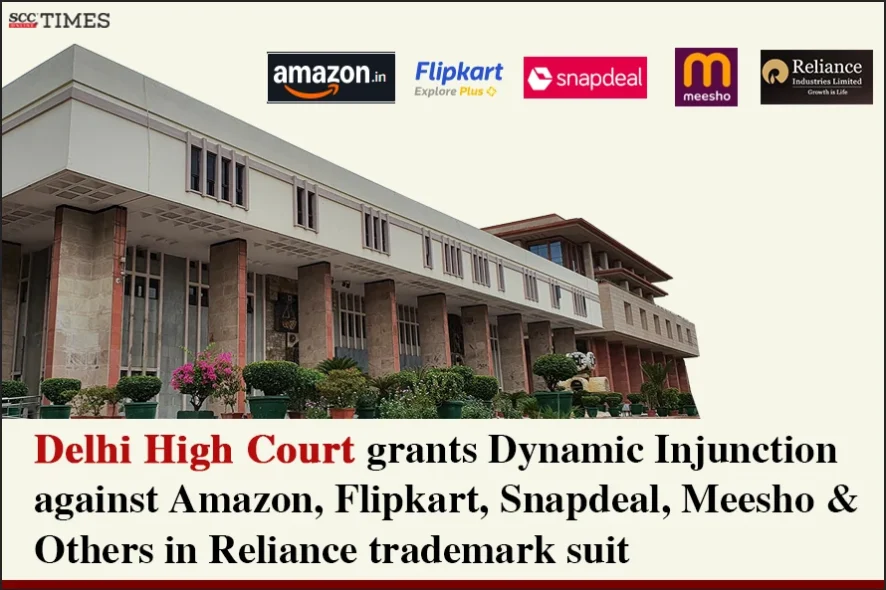Delhi High Court: A suit was filed by Reliance Industries Limited (plaintiff) under Order 39 Rules 1 and 2 seeking an ad-interim injunction, restraining the defendant 1 to 21(and such other entities/ individual during the course of the proceeding to have been engaged in infringing the Plaintiff’s intellectual property rights) from using the mark ‘RELIANCE’, ‘JIO’ and any other mark identical/ deceptively similar marks, including their variants, as also restraining the said defendants from using any packaging incorporating plaintiff’s artistic work thereby amounting to infringement of the plaintiff’s copyright. Saurabh Banerjee, J., restrained defendant 1 to 21 (and such other entities/ individuals, their directors, partners, servants, agents, dealers, retailers, distributors and all other persons acting for and on their behalf from manufacturing, offering for sale, selling, marketing/ advertising, adopting, using and / or dealing in any manner with respect to any product and service under the mark ‘RELIANCE’ and ‘JIO’ Formative Trademarks or any other identical/ deceptively similar to mark ‘RELIANCE’ and ‘JIO’ including the plaintiff’s ‘RELIANCE’ and ‘JIO’ Formative Trademarks.
The Plaintiff is a prominent Indian conglomerate and the flagship entity of the Reliance Group. It enjoys a formidable global presence and owns several trademarks including “RELIANCE” and “JIO,” which have been registered across various jurisdictions and in numerous classes of goods and services. The mark “RELIANCE” has been in continuous use since the 1960s, and the mark “JIO” was adopted in 2011 for the Plaintiff’s telecommunications business, which has since expanded into diverse sectors including digital services, cloud computing, retail FMCG, and e-commerce. The Plaintiff emphasized that both marks have been recognized as “well-known” by the Supreme Court of India and the Bombay High Court, respectively.
The factual backdrop to the present litigation is that in June 2025, the plaintiff discovered multiple online listings offering FMCG goods such as poha, wheat flour, makhana, pulses, lentils, and salt being sold under the “RELIANCE” and “JIO” trademarks on leading e-commerce platforms like Amazon, Flipkart, Meesho, Snapdeal, IndiaMart, and others. Upon further investigation, it was revealed that the source of these infringing listings could be traced back to defendants 1 to 21. These entities were allegedly misusing the plaintiff’s trademarks and copyrighted packaging designs, with the intent of passing off their products as those of the Plaintiff. The plaintiff argued that the infringing goods bore identical logos, color schemes, fonts, and layouts, incorporating distinctive features such as the flame device used by Reliance.
The plaintiff further contended that most of the infringing parties were using fictitious identities, rendering them difficult to trace. This factor, combined with the public interest angle given the products were for human consumption, justified immediate judicial intervention without pre-institution mediation. The plaintiff moved multiple applications seeking exemption from pre-litigation mediation, leave to file additional documents, exemption from advance service, and ad-interim injunctions.
The Court was satisfied with the urgency and gravity of the case, particularly considering the high likelihood of consumer confusion, the deceptive nature of the infringing packaging, and the risk to public health. It acknowledged that the infringing defendants were not only using marks identical or deceptively similar to the Plaintiff’s but were also mimicking the overall get-up and trade dress of the plaintiff’s goods. The Court noted that both parties were operating in the same business channels and targeting the same consumer base, including vulnerable and semi-literate consumers in rural markets.
The Court observed that the defendants had no plausible reason for adopting the impugned marks and concluded that their intention was to ride upon the goodwill and reputation of the plaintiff. He emphasized that in cases involving edible products and online commerce, where consumers often rely on brand names and logos to determine the source of goods, even a minor confusion could lead to significant harm. Therefore, the Court underscored the necessity of a stringent standard when assessing the likelihood of confusion in such cases.
Thus, the Court granted an ex-parte ad-interim injunction restraining defendant nos. 1 to 21, along with any other infringing entities identified in the course of proceedings, from manufacturing, marketing, offering for sale, or dealing in any manner with goods or services under the marks “RELIANCE,” “JIO,” or any deceptively similar variants. It also restrained them from using packaging that incorporated the Plaintiff’s copyrighted artistic elements or any other visual features that could create confusion or association with the Plaintiff’s goods. Additionally, the Court restrained the use of trading names, domain names, metatags, and other identifiers that could facilitate passing off.
The Court further directed defendant 22 to 28, comprising online platforms such as IndiaMart, Amazon, Flipkart, and others, to delist the infringing listings of the plaint and to furnish complete details such as contact, address, email, and banking information of defendant nos.1 to 21 and other infringing parties operating through their platforms. The platforms were also instructed to remove any future infringing listings upon notification by the plaintiff.
[Reliance Industries Limited v. Pawan Kumar Gupta, 2025 SCC OnLine Del 4903, decided on 10-07-2025]
Advocates who appeared in this case:
Mr. Ankit Sahni, Ms. Kritika Sahni, Mr. Chirag Ahluwalia and Mr. Mohit Maru advocates for plaintiff
Mr. Naman Joshi, Ms. Priya Goyal and Mr. Aakash Deep Singh, Advs. for D-22/ Indiamart. Mr. Akshay Maloo and Mr. Rishabh Rao, Advs. for D-23. Mr. Vivek Ayyagari, Ms. Mishthi Dubey and Mr. Abhay Aren, Advs. for D-25.


